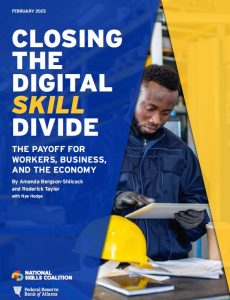While the digital access divide has gotten a lot of attention in the USA, the digital skill divide has had a much lower profile. That’s changing, according to a major new report from the US National Skills Coalition and the Federal Reserve Bank of Atlanta, called Closing the Digital Skill Divide: The Payoff for Workers, Business, and the Economy. The researchers examined 43 million job postings in 2021 and found the overwhelming majority of jobs in the US labour market now require technology skills – a demand that stretches across every industry and nearly every occupation, including entry-level and frontline workers. Understanding this digital transformation—and the digital skill divide that is disproportionately affecting workers of colour and small businesses – highlights the importance of workers having a baseline of foundational digital skills to succeed in the 21st century.
Key findings:
- 92% of all job ads in 2021 required digital skills, “robust” across all industries, with small businesses just as likely as their larger peers to seek workers with technology skills.
- Many workers have not had sufficient opportunity to build such skills: one-third of US workers do not have foundational digital skills, and workers of colour fall disproportionately into this category due to structural inequities.
- Public investments in workforce development and education are especially vital given the unevenness of private investments and the prevalence of digital skill demands among smaller businesses, which depend on publicly-funded workforce and education partners to upskill employees.
- Public investments in closing the digital skill divide can generate economic benefits for individual workers and the broader economy. People who qualify for jobs that require even one digital skill can earn an average of 23% more than those working in jobs requiring no digital skills—an increase of $8,000 per year for an individual worker.
The report recommends:
A digital skill foundation for all: All workers need the opportunity to develop broad-based, flexible digital problem-solving skills for current technologies and ongoing technological shifts. Policymakers can support this goal by investing in free or low-cost digital skills training for workers, and ensuring that workforce development and education providers are equipped to provide high-quality upskilling programs.
Ongoing up-skilling for every worker in every workplace: Workers in every industry need the opportunity to develop industry- and occupation-specific digital skills to adapt and advance in their careers. Policymakers must embed digital problem-solving skills as allowable or required activities under existing workforce development, adult education, and higher education policies, as well as digital equity policies.
Rapid re-skilling for rapid re-employment: We need to be ready for sudden disruptions to the labour market or specific industries. Policies should support rapid reskilling so workers can move from one industry to another.
CCA Comment:
“This US research accords with everything we at CCA have been tracking: it is not possible to participate in a significant way in the modern economy without digital skills. Australia’s adult and community education (ACE) sector leads the way in engaging with the most vulnerable and disadvantaged workers and learners in improving their digital skills base. We look forward to working with the Commonwealth and state governments, along with the Digital Skills Organisation – which now has policy responsibility for digital literacy VET skilling as part of their Finance, Technology and Business Jobs and Skills Council stage 1,” says CEO Dr Don Perlgut.
The Digital Divide report was written by Amanda Bergson-Shilcock and Roderick Taylor of National Skills Coalition, with data analysis by Nye Hodge, Federal Reserve Bank of Atlanta. The report team included Jeannine LaPrad and Rachel Unruh of National Skills Coalition and Sarah Miller, Federal Reserve Bank of Atlanta.
The US National Skills Commission (NSC) is a US non-profit organisation based in Washington DC that “fights for a national commitment to inclusive, high-quality skills training so that more people have access to a better life, and more local businesses see sustained growth. Since 2000, through expert analysis and technical assistance, broad-based organizing, targeted advocacy, and cutting-edge communications, NSC has changed hundreds of state and federal skills policies that have changed thousands of lives and grown local businesses and economies.” More detail here.






